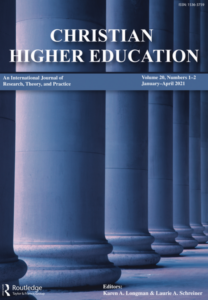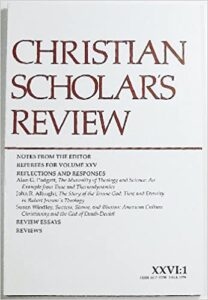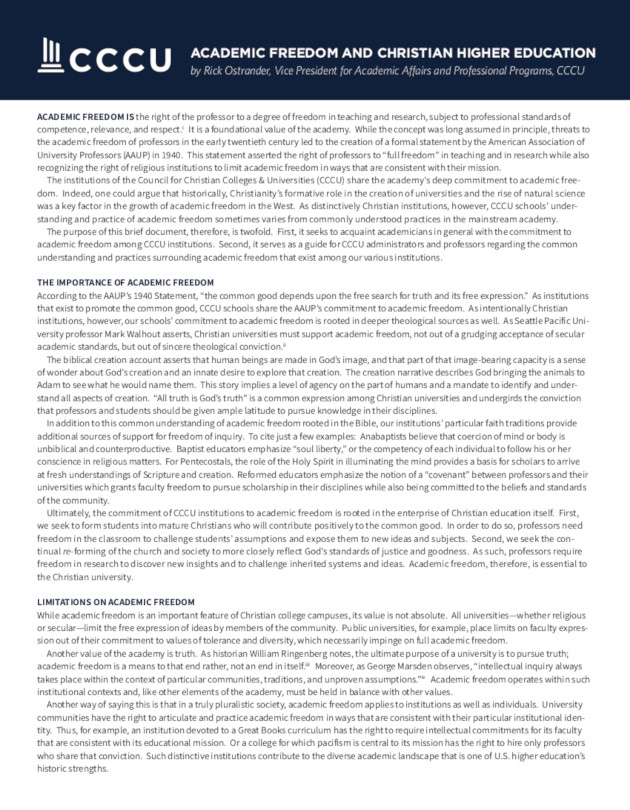Research
Overview
The CCCU maintains a unified collection of data to provide an overview of our institutions. This data will continue to grow in scope and distinction with the yearly addition of data and reports from the Collaborative Assessment Project (CAP).
Additional research is housed by the CCCU’s U.K. subsidiary Scholarship & Christianity in Oxford (SCIO) and available here.
Research and Reports on CCCU Institutions & Christian Higher Education
2022: State of Humanities at CCCU Institutions: Brief Summary
2021: Report on Supporting Diversity in STEM Faculty Hiring and Retention at CCCU Institutions
2021: State of STEM at CCCU Institutions: Brief Summary
2021: State of STEM at CCCU Institutions: Full Report
2021: Campus Diversity Statistics
2021: Campus Responses to COVID-19
2021: Economic Impact of Private, Nonprofit Higher Education (NAICU)
2020: The Case for Christian Higher Education
2019: Alumni Survey
2018: Economic Impact of Christian Higher Education
2018: The Case for Christian Higher Education
2018: Student Satisfaction
2017: Student Engagement
2016: Student Satisfaction
2016: Faculty Salary Trends
Annual Research Surveys
The CCCU conducts annual comprehensive surveys of both faculty and administration salary and benefits to give governing member institutions benchmarks for their institutional strategic planning.
All CCCU governing members and collaborative partner institutions are invited each July to participate. Both regional and national results are sent to presidents by the end of December. This service is provided free of charge for North American campuses. Due to the confidential nature of this survey, results are only available to participating presidents. The most recent survey was completed for 2020-21.
There are circumstances when mean data is made available. Please contact Jeff Clawson to request such data.
If you have any questions regarding the forms or reports, please contact Jeff Clawson at jclawson@cccu.org.
This is the 34th in an annual series of research reports conducted by the CCCU. The purpose of this study is to provide member colleges with comparative and longitudinal salary data.
The research has traditionally been based on information compiled for the AAUP, appearing in Academe each spring (for the current study, from March/April, 2018). For those U.S.-based members not represented in AAUP, the author used data surveyed by the CCCU. Due to changes in CCCU membership categories, only governing members are included in this survey; however, we have added a new appendix based on Carnegie Classifications that allow us to include collaborative partners and affiliate members.
CCCU Faculty Salary Survey 2017-18
CCCU Faculty Salary Survey 2016-17
CCCU Faculty Salary Survey 2015-16
CCCU Faculty Salary Survey 2014-15
CCCU Faculty Salary Survey 2013-14
CCCU Faculty Salary Survey 2012-13
CCCU Faculty Salary Survey 2011-12
CCCU Faculty Salary Survey 2010-11
CCCU Faculty Salary Survey 2009-10
The CCCU conducts an annual survey of president compensation packages on member campuses to give governing member institutions benchmarks for their institutional strategic planning.
All CCCU governing member institutions are invited each July to participate. Results are sent to the president by the end of September. This service is provided free of charge for governing members. Due to the confidential nature of this survey, results are only available to participating presidents. The most recent survey was completed for 2020-21.
If you have any questions regarding the forms or reports, please contact Jeff Clawson at jclawson@cccu.org.
Each year, the CCCU collects retention and graduation rates about all U.S.-based CCCU member institutions in order to provide our members with a profile of retention and graduation statistics for the CCCU as a whole. No individual institutional information is posted; only the aggregate data is compiled for this survey.
For the most recent data, please contact Jeff Clawson at jclawson@cccu.org.
Enrollment Trends and Growth depicts the enrollment trends for all U.S.-based CCCU institutions for total fall enrollment and undergraduate fall enrollment. The report also lists U.S.-based CCCU institutions that have demonstrated growth since 2015.
Questions? Contact Jeff Clawson at jclawson@cccu.org.
This is an annual survey of financial aid directors at CCCU institutions. Results of the survey are shared with participants in order to improve understanding of trends and best practices in the administration of financial aid at Christian colleges. The survey has been conducted annually since 1999 by personnel at Bethel University.
Questions? Please contact dc-nelson@bethel.edu.
This is the 33rd in an annual series of reports on tuition and fees at member institutions of the CCCU. The purpose of this study is to provide the CCCU membership with comparative, longitudinal data to assist institutions in their external benchmarking.
This report is based on data collected by the College Board (“Trends in College Pricing 2017”); their findings appeared in the November 2017 edition of The Chronicle of Higher Education. All 109 U.S. institutions listed on the CCCU website as “Governing Members” as of November 2017 have been included in this report. Next year’s survey will include all U.S.-based institutions. In preparation, we have included Collaborative Partners and Affiliate Member tuition figures for this year.
For more information on this survey, or for previous years, please contact Jeff Clawson, at jclawson@cccu.org.
Collaborative Assessment Project (CAP)
The Collaborative Assessment Project (CAP) orients CCCU members around a common set of campus assessments that help us provide empirical evidence that Christian higher education is indeed a significant and valuable enterprise.
As part of our commitment to advancing academic excellence, the Council for Christian Colleges & Universities assists our institutions in collecting and interpreting data for institutional improvement. Since 2000, therefore, we have operated the Collaborative Assessment Project (CAP), a research initiative led by the CCCU’s Christian Higher Education Research Council. Institutions that participate in CAP implement survey instruments as a cohort and are able to compare their results with national private college benchmarks as well as CCCU institutional benchmarks.
The surveys for the 2025-26 academic year are the Student Statisfaction Inventory (SSI) and the National Survey of Student Engagement (NSSE).
Click here for more information
The Collaborative Assessment Project (CAP) has been an ongoing project of the CCCU since 2000. This newly designed version of the project was developed as a result of consultation and needs assessment with our members and key peer group personnel.
Some of the benefits that come from participating in CAP include:
- A regular assessment cycle CCCU members can count on
- Benchmarking to national norms as well as CCCU members and affiliates
- Disaggregated comparative data by race/ethnicity
- Predictive models, action plans, and free webinars on how to use your results
More detailed information about the Collaborative Assessment Project (CAP) can be found here.
2025 Market Research Study
The CCCU and NACCAP commissioned a market research study of the value and perception of Christian higher education in 2025. Conducted by JM Partner Solutions, the executive summary is now available for full review here.
Additional information about receiving full access to the 500-page report, as well as additional resources and events taking place throughout the remainder of 2026, can be found on the NACCAP website.
Journal Access
Christian Higher Education is a peer-reviewed archival journal that features articles on developments being created and tested by those engaged in the study and practice of Christian higher education. Journal access is provided to CCCU institutions as a member benefit (free of charge). To access, please log in using your MyCCCU account.
Journal Login Article Submissions Dissertation List

Christian Scholar’s Review is a medium for communication among Christians called to the academic vocation. Its objective is the publication of peer-reviewed scholarship and research, within and across the disciplines, that advances the integration of faith and learning.

Research on STEM and Diversity Across the CCCU
Staff of Scholarship & Christianity in Oxford, the CCCU’s UK subsidiary, and affiliated researchers have been conducting research on the status of STEM programs, STEM student enrolment, and gender and racial diversity in STEM among both students and faculty members at CCCU member institutions. They have also been investigating the challenges facing underrepresented faculty members in STEM.
STEM Research
The CCCU and Scholarship & Christianity in Oxford (SCIO), the CCCU’s UK subsidiary, have received a $2.1 million grant from the John Templeton Foundation, with a further $256,000 grant from the M.J. Murdock Charitable Trust, to launch Supporting Structures: Innovative Collaborations to Enhance STEM Research at CCCU Member Institutions, a project designed to support and enhance STEM research among faculty and students on CCCU campuses.
This multi-faceted project will incorporate training, support, and events for faculty members, students, senior administrators, and the communities that feed into and support these institutions. It will expand research opportunities among existing, pre-tenure faculty members in the STEM fields and offer training to deepen their understanding of and engagement with issues pertaining to science, religion, and society. Additionally, the project has a specific fund dedicated to help participating campuses enhance diversity among their STEM faculty.
Economic Impact of Christian Higher Education
A 2018 study calculated the national economic impact of Christian higher education in the United States.
Networking Grants for Christian Scholars
Networking Grants for Christian Scholars were created to encourage collaborative scholarship among faculty serving at our institutions and to connect these faculty with broader networks of scholars and professionals. The program’s goal is to create and disseminate high-quality scholarship that brings Christian voices into contemporary academic conversations.
Grants for Campuses
As a valuable member service, we offer a wide variety of grant opportunities for CCCU campuses and faculty members (and several that support students).
Logos: Texts and Manuscripts
Scholarship & Christianity in Oxford (SCIO), the CCCU’s UK subsidiary, completed their 2020 workshop (held remotely), with funding provided by Steve and Jackie Green. Begun in 2012, the project brings together 30 up-and-coming biblical scholars (graduate students or graduating seniors headed to graduate school), a majority of whom historically have studied at CCCU institutions; faculty from CCCU institutions have also participated and regularly contribute to Logos. This two-week summer workshop combines lectures and workshops to advance the work of these developing scholars. The 2020 workshop lecture series featured a diverse range of speakers on issues of public engagement, the role of theological institutions upholding justice and supporting the marginalized, digitizing texts found in St. Catherine’s monastery in the Sinai, and the representation of Christianity in the National Museum of African American History and Culture.
Faculty Sabbatical Opportunity with the Lanier Theological Library
A new partnership between the CCCU Research and Scholarship team and the Lanier Libraries (Houston, TX, and Oxford, UK) has been established to offer faculty from CCCU member institutions substantial opportunities to utilize their research space and collections with housing offered at a 50% discount from normal market rates in Oxford and free housing in Houston.
Campus faculty can enjoy the chance to spend anywhere from two weeks to a few months of their sabbatical studying and staying at either the Lanier Theological Library in Houston, TX or Yarnton Manor, near Oxford, UK.
This opportunity is primarily intended for full-time faculty on long-term (or annually renewing) contracts, though applications from part-time faculty will also be considered. It is also intended primarily for faculty producing publishable research with preference given to those whose research project will advance the field. Preference will be given to faculty in Bible and theology, but faculty from other academic disciplines may also apply.
Learn More About the Lanier Foundation Start an Application
Information about Yarnton Manor (Oxford, UK) Information about Lanier Theological Library (Houston, TX)
Academic Freedom and Christian Higher Education
Academic freedom is the right of the professor to a degree of freedom in teaching and research, subject to professional standards of competence, relevance, and respect. It is a foundational value of the academy. CCCU institutions share the academy’s deep commitment to academic freedom, and this document serves as a guide for CCCU administrators and professors regarding the common understanding and practices surrounding academic freedom.
